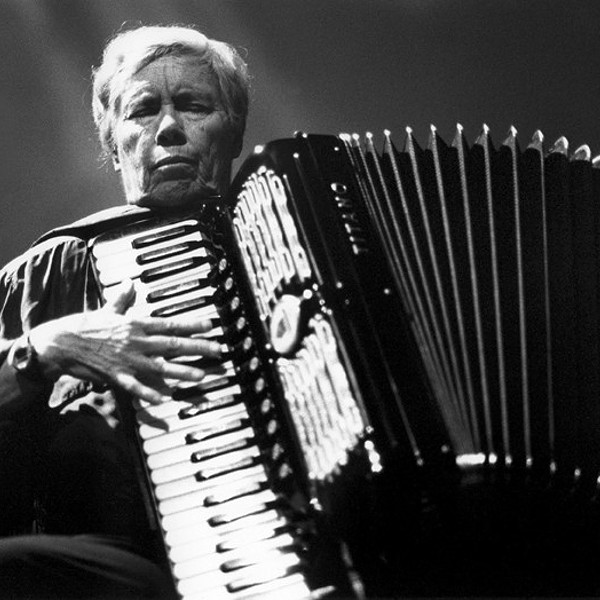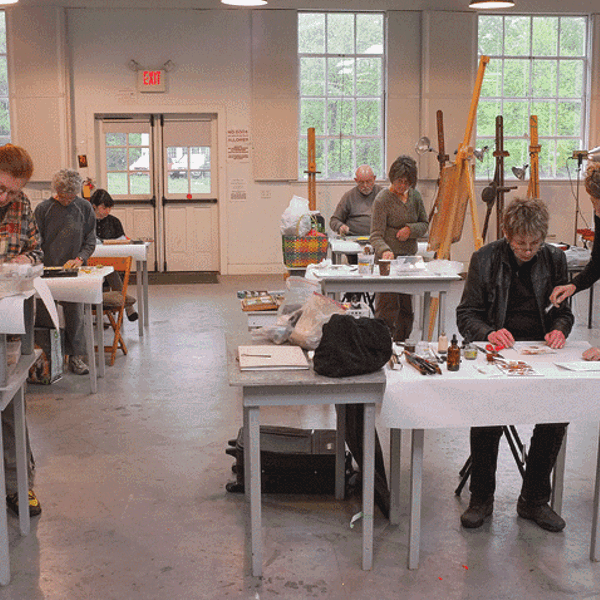Eileen MacDougall bends over a table, paintbrush in hand, considering how to decorate the all-white baby onesie in front of her. Around her, women are dipping their brushes into DayGlo pots of fabric paint, then carefully brushing messages onto their own onesies. “Let’s use our outside voices!” reads one; another identifies its potential newborn wearer as a “Product of the Labor Movement,” and one more reads, “I’d be cuter with universal health care.”
MacDougall, a 55-year-old mother from Wilmington, Massachusetts, eventually settles on “My mom is MAD…and she VOTES,” which she writes with a flourish in orange, embellishing the text with ribbons on either side. Next to her, Elisa Batista, a 31-year-old mother of two from Berkeley, California, paints “Security for All” in vivid purple letters on the onesie in front of her.
The women—and, it should be pointed out, one man—are among two dozen participants at a weekend workshop, MomsRising: Organizing for a 21st Century Women’s Movement, at Omega Institute near Rhinebeck. Led by Joan Blades and Kristin Rowe-Finkbeiner, co-founders of an online grassroots advocacy group called MomsRising (MomsRising.org), the workshop is hosted by Omega’s Women’s Institute, which seeks to examine the relationship between women and power. “Historically, the voice of the mom has been really left out of the public discussion,” says Carla Goldstein, director of the Women’s Institute (and a mother of two girls). “Now, moms are increasingly in the workforce and the public space.”
They’re also online. MomsRising is the most prominent voice of a rising mother’s movement that, if Blades and Rowe-Finkbeiner’s instincts are right, could have broad social impact: changing how America thinks about, and treats, its mothers.
I’D BE CUTER WITH PAID FAMILY LEAVE
The leaders of this resurgent women’s movement, Blades and Rowe-Finkbeiner, at first seem like unlikely partners. Blades, who began her career as a divorce mediator and software developer, is best known for founding MoveOn.org, the liberal political action group, with her husband, Wes Boyd. Rowe-Finkbeiner is an author, freelance journalist, and consultant with expertise in environmental and public policy who is married to a former Republican senator from Washington State. Their experience with diff erent political constituencies is far from a problem, though; if anything, it’s MomsRising’s secret weapon. “We want to be universal,” says Blades, and Rowe-Finkbeiner adds, “It doesn’t matter if you’re a Democrat or a Republican when you have a baby. These issues impact all of us.”
Consider, for example, one of the most basic issues: fair pay for equal work. Eileen MacDougall, who’s dressed in a purple shirt with white lettering that reads “Outrageous Older Woman,” outlines the core issue that brought her to MomsRising as she brushes orange letters onto her onesie. “I work in a large financial instution,
and although the company is benevolent, I don’t know if I’m getting pay equal to the men who are doing the same work as me,” she says. “There’s just no way to be sure.”
Blades and Rowe-Finkbeiner’s message is simple: America’s mothers are in a bind. Paid less than their male counterparts, forced to leave sick family members uncared for or forfeit pay, rarely given paid leave after birthing a child—working mothers in the United States have fewer support systems than mothers in almost any other country. When it comes to the issue of parental leave after childbirth, for example, there are only four countries—Swaziland, Lesotho, Papua New Guinea, and the US—that don’t have a national policy to provide some kind of paid leave.
Since its inception, on Mother’s Day 2006, MomsRising has campaigned on issues that concern mothers, from fair pay and paid family leave to toxicity levels in children’s toys. The organization’s membership crosses political and socioeconomic lines: MomsRising is making particular efforts to reach out to women of color and low-income women. So far, there are 150,000 active members who do everything from signing online petitions to visiting legislative representatives.
Even the onesies are part of the plan. MomsRising has amassed 2,500 of the customized outfits, in a campaign cleverly called “The Power of Onesie.” Used for displays in front of state legislatures, the onesies are pleasingly eye-catching and give an ironic twist to the cliché of politicians kissing babies. “No pressure, but every time we’ve used the onesie display, we’ve been able to push a bill through,” Rowe-Finkbeiner says with a laugh as the participants wield their brushes.
Elisa Batista, who’s painting the “Security for All” onesie, got involved with MomsRising when, as a new mother, she realized how limited her options were. Five years ago, Batista was working as a reporter for Wired magazine when shebecame pregnant with her first child. “The company had no telecommuting or flextime
policy, and I couldn’t face the idea of a two-hour daily commute,” she says. Instead, Batista quit her job and launched MotherTalkers.com, a website where she blogs about issues from women’s health to work-life balance. Minimally funded by advertising, the site has boosted her sense that she’s not the only mother grappling with these issues. “I feel like I have an online community of like-minded moms,” she says, gluing yellow and orange feathers to her onesie.
Community—whether on-or offline—may be the key. New parents often joke that their job is 24 hours a day, seven days a week, with no vacation, no sick days, no pay, and a boss who’s the most inarticulate and dependent person one knows. Anita Jackson, who now works as a part-time staffer for MomsRising, joined the
organization just before giving birth to her first child. “Motherhood can be really isolating,” she says. “MomsRising recognizes that reality. I’d never seen this kind of organizing done on behalf of moms before.”
And men need not feel left out. MomsRising welcomes them, and two of the bloggers on its website are men—one of whom, Dana Glazer, proposes that “Only when men and women, moms and dads alike, can work together, is there a real chance to fix so many of the problems plaguing our culture.” Joe Dinkin, the lone man at the Omega workshop, worked directly with MomsRising last year on a campaign for paid sick leave in Connecticut: The bill died in the Senate after passing the House, but Dinkin says his group, Connecticut Working Families, will try again next year. “I came here to strategize about future campaigns,” Dinkin says. Of being the only man there, he says, “It’s easy to joke about, but it’s not a big deal.”
MY MOM IS MAD…AND SHE BUYS
Part of MomsRising’s growing popularity is that members choose their level of involvement: They can spend anywhere from five seconds (just clicking a button to sign an online petition) to several hours a week volunteering. In the past year, members took over a million trackable online and on-the-ground actions, and, in the past two years the organization has garnered one thousand instances of media coverage. “The sheer volume of engagement is inspiring to me,” says Rowe-Finkbeiner. “Our average action rate per member is 14 actions per year, which is hugely high.”
Another reason for its success is that, as an online organization, MomsRising can be “responsive to the environment in a real time way,” as Blades puts it. Part of this responsiveness involves floating new issues to its members and seeing which ones resonate. Last year, for example, Blades decided to see if members were interested in the issue of toxins in children’s toys. They were, and MomsRising partnered with HealthyToys.com to make available a database of toxic toys that could be accessed by text message.
This year, the work on toxins continues. In April, MomsRising formed a coalition with environmental groups to protest the use of bisphenol A (BPA), which is thought to cause developmental problems, in baby bottles. Within two weeks, MomsRising had collected 16,000 signatures on a petition (the other coalition members contributed 4,000 signatures) that was delivered to Wal-Mart, Babys “R” Us and Toys “R” Us, CVS, and Playtex. Faced with the petition, the companies promptly announced that they would stop manufacturing and selling baby bottles containing BPA.
What accounts for such a quick reaction? “The companies understand they’re doing a better job for their customers by getting rid of that stuff in their products, and they made a good call,” says Blades. More cynically, one could say the companies saw MacDougall’s onesie writ large, with one small difference: “My mom is
MAD…and she BUYS.” Call it the power of momsie.
THE INVISIBILITY OF MOTHERS
Twelve years ago, Rowe-Finkbeiner gave birth to a son whose immune system was compromised (the problem has since been resolved), making him ineligible for day care. Curious, Rowe-Finkbeiner called the US Census Bureau and the Bureau of Labor Statistics, trying to find out how many other women in the country were at home with children. The answer floored her. “They said that the data wasn’t tracked because stay-at-home parents don’t make any money,” she says. Rowe-Finkbeiner knew, however, that data on households is used for everything from road building to attracting new businesses to an area. For her, the lack of any information on stay-at-home mothers signified something critically important: “the true invisibility of mothers.”
Rowe-Finkbeiner began to write about the issues for the magazine Bust, then saw that she had enough material for a book. In 2004, she was about to publish The F-Word: Feminism in Jeopardy when it occurred to her to send the manuscript to MoveOn.org to see if Blades would endorse it.
Sitting on the stoop of one of the residential buildings at Omega, Blades and Rowe-Finkbeiner laugh as they recall how Rowe-Finkbeiner got a lot more than her endorsement. “It was a very good book; it educated me,” says Blades, and Rowe-Finkbeiner lobs back, “Joan’s amazing at deep thinking. I was so excited she liked the book.” Blades laughs and rolls her eyes. “I had no intention of starting another online group,” she says, “but there was just a synchronicity there.”
Reading the book, Blades was flabbergasted when she came across the figures from a study by Jane Waldfogel, a professor at Columbia University: While women without children earn 95 percent of men’s salaries, mothers earn on average 72.6 percent, and single mothers’ earnings drop still further, to 56 to 66 percent. In other words, women who choose to have children are penalized in the form of lower wages that can add up to a lifetime shortfall of up to $1 million—and, since 81 percent of American women become mothers by age 44, that’s a lot of inequality. “That made my mouth drop open,” Blades says. “It was an ‘Aha!’ moment. I knew I had to do something.”
Blades was moved to write a two-page position paper on mothers’ issues, which got a public airing when her friend Arianna Huffington, the influential writer and political commentator, persuaded her to read it at a party in Hollywood. “After I’d read my two pages, these Hollywood moguls all looked at me and said, ‘You’re right—now what are you going to do about it?’” Blades recalls. She got on the phone to Rowe-Finkbeiner, and the two agreed to expand Blades’s paper into another book, The Motherhood Manifesto. The seeds for MomsRising were sown.
FLEXING ITS MUSCLE
Naturally enough, MomsRising borrows a lot of its structure from MoveOn.org, where Blades learned her online grassroots organizing. Like MoveOn, MomsRising encourages its members to throw house parties in order to spread the word about the organization. Guests view the Motherhood Manifesto documentary, produced in
association with the book. Clearly low-budget, the documentary is earnest and a little clunky, but it contains memorable moments, like the scene where a smiling woman tells her friend she’s going to start a family. “Are you crazy?” the friend shoots back. “Don’t you know what happens to mothers in this country?”
At the two-year mark, MomsRising has already shown that it has considerable muscle. In April this year, following heavy campaigning by MomsRising, New Jersey’s state senate approved a bill giving employees the right to paid leave to care for a sick relative or newborn. Bills on paid family leave have come close to passing in New York and Oregon, and are expected to pass soon in those states. In Washington, DC, legislators are working to expand paid family leave for federal workers, flight attendants, and even military personnel.
Last year, thanks partly to lobbying efforts by MomsRising, Washington became the second state in the US to provide parents with paid family leave. (California was the first, before the formation of MomsRising.) The passage of the bill followed the organization’s first-ever onesie display. “The onesies really made a difference,”
says Marilyn Watkins, chair of the Family Leave Institution in Washington, who’s attending the Omega workshop. “The legislators took notice of the large voting block we had behind us, and, of course, they all wanted to be photographed next to the onesie line.”
“We’re seeing a lot of work in that area,” Rowe-Finkbeiner remarks. “Of course, we want paid FMLA [Family Medical Leave Act], which is also family leave insurance, for everybody. But we’re seeing that we’re getting there at the state level, and we’re getting there step by step at the federal level.”
Other campaigns have gathered speed in the past year, too. MomsRising has been particularly active on the issue of fair pay, coming out in support of the Lilly Ledbetter Fair Pay Restoration Act. The act seeks to reverse a ruling by the Supreme Court in the case of Lilly Ledbetter, a supervisor at Goodyear who was paid as much as 40 percent less than her male counterparts over two decades. In the 5-to-4 decision against Ledbetter on May 29, the Supreme Court ruled that employees have just 180 days from the fi rst discriminatory paycheck to seek redress, and no right to challenge subsequent inequitable paychecks. MomsRising members were inflamed,
feeling that—as Justice Ruth Bader Ginsburg wrote in her dissent—“cause to suspect that discrimination is at work develops only over time.”
One of MomsRising’s more colorful actions earlier this year concerned the Fair Pay Restoration Act. When John McCain reacted with the infamous statement that women needed “education and training,” MomsRising sent out an e-mail asking members to send in their resumes. Over 10,000 resumes were delivered to McCain’s office by volunteers wearing bright sashes that read “Magnifi cently Overqualified Mother,” or MOM. “Fifty-six percent of college graduates are women right now,” Rowe-Finkbeiner argues, “so that is not the key problem here. The key problem is that women aren’t paid equal wages for equal work, still. So this law is very much needed.”
The McCain incident stirred up strong feelings, and signs indicate that they’re not going away. When MomsRising members came out in force for an Equal Opportunity rally in support of the Lilly Ledbetter Fair Pay Act in Washington, DC, on July 17, House Speaker Nancy Pelosi did a call-out to the organization, saying that the reason the act would pass is because “this is a family issue and Moms are Rising!”
READY FOR PRIME TIME
At Omega, participants discuss how to broaden the movement by attracting a diverse range of women. “Do we have someone who’d be willing to go on the Bill O’Reilly show?” asks one woman in a group feedback session. “Maybe we could start online moms’ groups by baby age,” offers another. Other suggestions include offering
low-cost health insurance, sending new mothers a “welcome wagon” of e-mails, and launching monthly MomsRising book and movie clubs across the nation, which Rowe-Finkbeiner says would “really spark more on-the-ground engagement.”
“A lot of women’s organizations in the past have been seen as being about white, middle-class women,” says Rowe-Finkbeiner. “We have to remedy that.” Judging by the overwhelmingly white faces gathered at Omega, success on that front might be slow so far, but Blades says the organization is having good results reaching out to other demographics through faith communities and potlucks.
With the presidential election fast approaching, Blades and Rowe-Finkbeiner see an opportunity to grow the organization by getting its issues into the forefront of the national debate. Its 501c(3) status prevents it from campaigning directly for a party or candidate, but since MomsRising aims to be inclusive and nonpartisan, that’s not an issue. Rather, Rowe-Finkbeiner sees the organization’s mission as twofold: pushing to change the stale terms of the national debate while giving members the tools to discern for themselves where candidates stand on the issues.
To do this, MomsRising is bringing wit and style—hallmarks of third-wave feminism—to the debate. One example is its “Presidential Bingo” game, where participants check off an issues card while watching televised election debates. (How many times did Obama or McCain mention maternity leave? Or fair pay?) There’s also the “Don’t Get Sick” game, an interactive quiz on the website where viewers click to shoot tissues at giant noses in between learning factoids about sick leave (“Nearly 50 percent of private-sector workers have no paid sick days”). Other features include a countdown to the election, candidate forums, and candidate video blogs.
So far, MomsRising is seeing great returns. On July 10, Barack Obama appeared on NBC’s “The Today Show,” where he answered questions about his economic agenda to support women. Obama reiterated MomsRising’s statistics on the wage gap, then went on to mention paid family leave, support for childcare, and overturning
the Supreme Court decision on Ledbetter v. Goodyear. An e-mail circulated by MomsRising the next day began, “Finally, our issues are on center stage, where they belong—and are being addressed by a presidential candidate!”
Compare that to the last presidential campaign, where the wage gap between men and women was discussed only as a side comment by John Kerry in one debate. “It was like a pickup line in a seedy bar. Like, ‘I’m going to get some women voters here,’” says Rowe-Finkbeiner. “I’ve really seen a change, in that these issues are being taken more seriously and addressed more seriously. Due to that, I think more women will probably turn out to vote. But that remains to be seen.”
For Blades, the future looks rosy. With increased funding from foundations and philanthropists flooding in, she’d like to hire more staff ers to concentrate on each issue area, “so that we can really get our membership engaged more deeply and broadly.” And she anticipates that, as the organization gains wider publicity and support, there will be more victories like state-mandated family leave and BPA withdrawal. “Most companies and government agencies want to be doing a good job, and they see we can help them,” she says.
Leaning back on the stoop, Blades looks around and beams a high-wattage smile. “We’re getting results because people know that mothers aren’t just thinking of themselves; we’re more likely to take the long view, and we can be trusted,” she says. Later, as the two walk through the campus at Omega, Rowe-Finkbeiner puts it a bit more bluntly. “Let’s be honest,” she says. “We’re kicking some butt.”


















